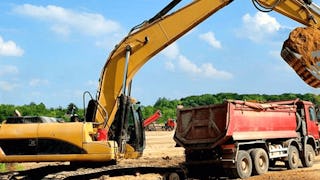Filter by
SubjectRequired
LanguageRequired
The language used throughout the course, in both instruction and assessments.
Learning ProductRequired
LevelRequired
DurationRequired
SkillsRequired
SubtitlesRequired
EducatorRequired
Explore the Earth Sciences Course Catalog
 Status: Preview
Status: PreviewUniversity of Manchester
Skills you'll gain: Physical Science, Environment, Hydrology, Water Resources, Mathematical Modeling, Climate Change Adaptation, Environmental Science, Biology, Simulations, Scientific Methods, Chemistry
 Status: Preview
Status: PreviewThe University of Chicago
Skills you'll gain: Climate Change Mitigation, Environment, Climate Change Adaptation, Environmental Issue, Physical Science, Sustainable Development, Physics, Mathematical Modeling, Thermal Management, Environmental Science, Simulations, Energy and Utilities, Chemistry, Systems Of Measurement
 Status: Free Trial
Status: Free TrialRice University
Skills you'll gain: Environment, Environmental Science, Life Sciences, Environmental Issue, Biology, Sustainable Development, Natural Resource Management, Climate Change Adaptation, Estimation, Climate Change Mitigation, Experimentation, Mathematical Modeling, Case Studies, Research Methodologies
 Status: NewStatus: Free Trial
Status: NewStatus: Free TrialSkills you'll gain: Prompt Engineering, Prompt Patterns, Generative AI, AI Personalization, Responsible AI, Data Ethics, ChatGPT, Education Software and Technology, Anthropic Claude, Learning Management Systems, Artificial Intelligence and Machine Learning (AI/ML), Artificial Intelligence, Ethical Standards And Conduct, Machine Learning, Information Privacy, Emerging Technologies, Data Security, Mitigation
 Status: NewStatus: Free Trial
Status: NewStatus: Free TrialSkills you'll gain: Construction, Hydraulics, Construction Engineering, Equipment Design, Maintenance, Repair, and Facility Services, Grading (Landscape), Civil Engineering, Construction Management, Safety Standards, Plant Operations and Management, Vibrations, Facility Repair And Maintenance, Production Process
 Status: Free Trial
Status: Free TrialDartmouth College
Skills you'll gain: Environment, Environmental Issue, Environmental Science, Demography, Energy and Utilities, Sustainable Development, Biology, Hydrology, Water Quality, Nutrition and Diet, Oil and Gas, Electric Power Systems, Systems Thinking, Water Resource Management, Natural Resource Management, Sustainable Technologies, Physics, Climate Change Mitigation, Construction, Chemistry
What brings you to Coursera today?
 Status: Free Trial
Status: Free TrialUniversity of Colorado Boulder
Skills you'll gain: Climate Change Mitigation, Risk Management, Climate Change Adaptation, Mitigation, Business Risk Management, Risk Analysis, Environmental Issue, Environment, Corporate Sustainability, Environmental Resource Management, Persuasive Communication, Media and Communications, Environmental Policy, Social Sciences, Scientific Methods, Vulnerability, Political Sciences, Community Development, Policy Analysis, Water Resource Management
 Status: Free Trial
Status: Free TrialUniversity of Illinois Urbana-Champaign
Skills you'll gain: Stakeholder Engagement, Environmental Monitoring, Hydrology, Community Outreach, Water Resource Management, Environmental Engineering and Restoration, Water Resources, Cultural Diversity, Policy Analysis, Social Sciences, Cultural Sensitivity, Environment and Resource Management, Environmental Laws, Environmental Engineering, Natural Resource Management, Land Management, Case Studies, Water Quality, Environmental Issue, Climate Change Adaptation
 Status: Free Trial
Status: Free TrialUniversity of Michigan
Skills you'll gain: Sustainable Development, Social Justice, Geographic Information Systems, Organizational Change, Sustainable Business, Environmental Policy, Environmental Regulations, Geospatial Mapping, Culture Transformation, Environmental Resource Management, Sustainability Reporting, Spatial Data Analysis, Environmental Social And Corporate Governance (ESG), Environmental Issue, Strategic Leadership, Corporate Sustainability, Leadership, Collaboration, Financial Analysis, Critical Thinking
 Status: Free Trial
Status: Free TrialUniversity of Florida
Skills you'll gain: Land Management, Climate Change Mitigation, Sustainable Development, Environment and Resource Management, Water Resource Management, Water Sustainability, Sustainability Standards, Climate Change Adaptation, Natural Resource Management, Plant Operations and Management, Sustainable Systems, Environment, Water Resources, Systems Thinking, Environmental Science, General Science and Research, Taxonomy, Spatial Analysis, Socioeconomics, Biology

University of North Texas
Skills you'll gain: Operations Management, Exploratory Data Analysis, Mediation, Change Management, Business Writing, Compensation and Benefits, Apache Hadoop, Consumer Behaviour, Organizational Change, Stakeholder Management, Event Management, Grammar, Social Media Strategy, Business Ethics, Sales Process, Diversity Awareness, Conflict Management, Research, Nutrition and Diet, Data Mining
 Status: Preview
Status: PreviewDuke University
Skills you'll gain: Environmental Monitoring, Environmental Regulations, Environmental Laws, Environmental Science, Geospatial Information and Technology, Ethical Standards And Conduct, Global Positioning Systems, Research, Data Management, Critical Thinking
In summary, here are 10 of our most popular earth sciences courses
- Our Earth: Its Climate, History, and Processes: University of Manchester
- Global Warming I: The Science and Modeling of Climate Change: The University of Chicago
- Introduction to Biology: Ecology: Rice University
- Generative AI for Educators: IBM
- Construction Machinery for Concreting /Roads & Earth Moving: L&T EduTech
- Introduction to Environmental Science: Dartmouth College
- Exploring Our Responses to Climate Change: University of Colorado Boulder
- Wetland Science and Conservation: University of Illinois Urbana-Champaign
- Green Skills for a Sustainable and Just Future: University of Michigan
- Agroforestry: University of Florida










